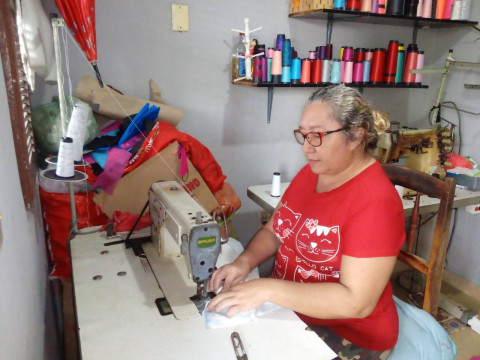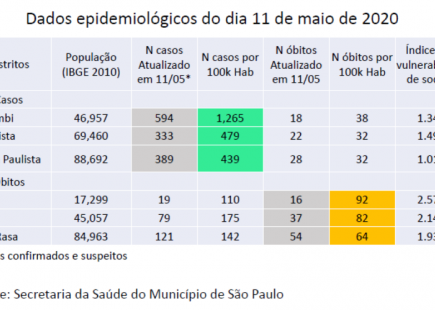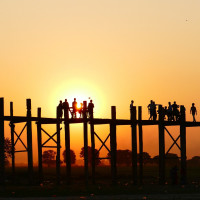A tale of two Brazils: Solidarity shines through Bolsonaro's Covid disaster
Temas
Brazil's staggering inequality makes it especially vulnerable to the Covid-19 crisis. Social movements and communities have stepped in to fill the void left by a government guided by greed and ineptitude.

Brazil is one of the most unequal countries in the world. The combined wealth of the poorer half of Brazil's population, some 100 million people, is less than the combined fortune of its six richest individuals. Fully 16 million people – roughly equivalent to the population of Cameroon or the Netherlands – live below the poverty line. With 51% of tax receipts coming from consumption taxes, the middle and working classes pay the majority of taxes. Although Brazil's public health system is among the most democratic in the world, providing universal access, successive neoliberal governments have cut its budget and transferred resources to different, mainly private, interests.
Previous governments under Lula da Silva and Dilma Rousseff introduced poverty-reduction policies that saw the country removed from the United Nations World Hunger Map. Brazil's international reputation soared with membership of the BRICS and other regional blocs, bringing hope for a more prosperous future and a chance to finally narrow the nation's inequality abyss. But this flame of hope did not last long.
President Dilma Rousseff was removed from office in a coup d’état in 2016. Social policies were dismantled. Hard-won social rights were eliminated. Just two years later, as he led the polls ahead of the 2018 elections, her ally and former president Lula da Silva was imprisoned without evidence. These broken politics, along with corruption and mass privatisation of public services saw a surge in public discontent. And into this melee stepped Jair Bolsonaro, a champion for a culture of hate who is openly nostalgic for the days of Brazil's brutal right-wing dictatorship. By the time this latest crisis arrived, Bolsonaro's mishandling of the country was as bad or worse than many had predicted. The Lancet had this to say, “perhaps the biggest threat to Brazil's COVID-19 response is its president, Jair Bolsonaro”.
Bolsonaro's agenda favours corporations, not citizens. Private interests have controlled Brazil for a long time but now their influence is much more total. Officially, 54% of elected members of the national congress have taken campaign donations from large corporations involved in real estate speculation, though the real number is presumably much higher. Election campaign finance is a kind of speculative investment to ensure public resources are directed to private priorities, rather than being invested in health, education, or better living conditions for the population. Inequality ends up being a political project.
Since his election, the destruction of Amazon forest lands has dramatically increased. His disdain for minorities and indigenous peoples is evident; for instance, when he approved a concession of protected land to mining companies he commented that the people affected “'should adapt and live within civilised places”. His government's attitude to the working class is evident in other actions also, such as Brazil’s withdrawal from the UN Global Compact for Migration and the closure of the Ministry of Labour and Employment, which was responsible for the regulation of relations between employers and employees.
This mix of high rates of inequality, bad governance and leadership, and private capture is clearly very damaging, mainly for the most socially vulnerable populations. A society that is already failing its citizens is particularly vulnerable when a disaster like the outbreak of Covid-19 occurs. The first acknowledged case in Brazil occurred on February 25. Soon, the government's inadequate attention to public health policies were laid bare.
Brazil's formerly democratic health system has been rocked by neoliberal reforms. Since the adoption of the Federal Constitution of 1988, the Unified Health System (SUS) has been structured across the three levels of government – federal, state and municipal – so responsibilities are integrated and complimentary, prioritising collective health. The system’s framework encompasses deliberative councils at the three levels of governance, facilitating wide participation of public representatives, service providers, managers and health professionals. But after the 2016 coup, the government ratified Constitutional Amendment 95, which imposed a new tax regime limiting the expenses of the federal government for a period of twenty years. Aiming to avoid increases in the public debt to GDP ratio, this amendment includes all three levels of governance, as well as the Union’s Public Ministry and the Public Defenders’ Office. Since the introduction of the amendment, public investments and expenses have been fixed at the amount spent during the previous year, adjusted only for inflation. Over four years, investment in education has been reduced by 56% and health spending per capita reduced from R$595 (US$112) in 2O14 to R$555 ($104) in 2020. In practice, all social measures, including health, have suffered decreases in public investment, strongly impacting the response to the Covid-19 pandemic.
Bolsonaro’s team has also been too sluggish to prevent the situation from getting worse. Many senior officials are scientifically illiterate or ignorant and have publicly supported conspiracy theories including the idea that the earth is flat, that global warming is a Marxist plot, and that the coronavirus is only a harmless “little flu”. The president meanwhile participates in demonstrations and events, shakes hands and boycotts social distancing.
The leadership, such as it is, is in disarray. The Minister of Health, Luiz Henrique Mandetta was fired on April 16th, after disagreeing with the president about social isolation policies. The following week, the physician Nelson Luiz Sperle Teich assumed the ministry, but left less than a month later for disagreeing about the general use of hydroxychloroquine. For two weeks Brazil has had no Minister of Health, a seemingly inconceivable scenario in a nation that had not yet reached peak infections at the time of writing. There is no integrated strategy between different levels of government and the president has practically declared war on a few state governors who defend social isolation.
The Covid crisis in Brazil borders on chaos. By June 2, Brazil had the second highest number of confirmed cases in the world, more than 530,000 cases and 30,000 deaths—underreporting means these numbers are likely to be far higher. More than 1,300 confirmed Covid deaths have been recorded per day this week (to June 20). On June 7, the president announced that the government would no longer report official Covid numbers. Research conducted by the BBC in April ranked Brazil in sixtieth place out of seventy-five countries for number of tests conducted.
In stark contrast to the actions taken by Brazil, other international responses have been far more effective. One such example is the programme implemented by Argentina. Although also facing problems common to Brazil, including an extremely polarised political environment and an equally unstable economy plagued with high rates of informal work and unemployment, Argentina has nonetheless managed to succeed where Brazil has failed. Argentina’s effective management is all-the-more impressive considering the Argentinian health system is far less structured than Brazil's.
Argentina acted quickly, pre-emptively responding to increasing international numbers by closing borders and requiring individuals over sixty to stop working. The president, Alberto Fernandéz, urged state governors, regardless of party affiliation, to work together for the common goal of implementing successful containment measures, such as the creation of a strict quarantine, in which the only exceptions made were for the food, energy and telecommunications sectors. Along with numerous measures, including the transfer of resources for elderly and informal workers, the government has implemented a communitarian isolation programme in vulnerable neighbourhoods, assuring access to food and water in these areas.
When comparing the actions taken by Argentina to those of Brazil, it becomes apparent that the actions of Bolsonaro’s government fall far short of those of Argentina and other successful international responses. While the Argentinian government works across party lines to effectively battle Covid-19, Bolsonaro and Joao Doria, the state governor of São Paulo, do little more than exchange profanity-laced insults.
A study of 48 countries conducted by Imperial College London, which analysed the active transmission rate of Covid-19, ranked Brazil as the country with the highest rate of transmission. Social isolation is very difficult for the 13 million people who live in slums, usually with more than three people in the same room, with no access to decent living conditions such as clean water and sanitation. Most of those people are informal workers who need to keep working, find food or queue at banks to get their monthly benefit: In Brazil the most affected population is not the elderly, but the poor.
In a city like São Paulo, for instance, inequality is stark. Life expectancy varies by as much as twenty years from one neighbourhood to the next. The pattern of Covid-19 infections follows the same path: according to a study conducted by the University of São Paulo (graphic below) in different neighbourhoods between April and May, Morumbi, a middle and upper-middle class neighbourhood, with a social vulnerability index of 1.34, had 1,265 cases and 38 deaths for each 100,000 residents while in Pari, a neighbourhood classified with a social vulnerability index of 2.57, had only 110 cases but 92 deaths for each 100,000 residents.

The government has abandoned Brazil's most vulnerable communities to suffer and die. However, because the population has become used to such treatment, community organisation is strong, providing some solidarity, social support and collective care.
Paraisópolis, a neighbourhood of 100,000 vulnerable residents in southern São Paulo, worked with the G10 Favelas (a group of social leaders in slums around Brazil fighting to create a social impact inside the communities) to create an ambitious strategy to face the pandemic and quarantine. Neighbourhood committees have been organised to map and identify volunteer leaders. Each leader (or Street President) is responsible for fifty houses, distributing information on the importance of social isolation, delivery of food baskets and monitoring of infected people. The initiative includes four ambulances and two vans support the distribution of food and cleaning products. A crowdfunding campaign has also been created to fund two recently established houses to host people infected with Covid-19 or H1N1 who cannot isolate at home. The house's 510 beds all comply with recommended social isolation guidelines.
Social movements have also focused their efforts on protection of vulnerable communities. As mentioned above, besides being more exposed to the disease, most people living in the peripheries have lost their jobs or have informal work (street vending, for instance) and have no source of income whatsoever. The Homeless Workers’ Movement (MTST) has created a grassroots campaign organising territorial brigades for mutual support; participants share their needs and collective solutions, as well as a channel to denounce risky situations such as workers who are obligated to work without security or personal protective equipment, or communities that don’t have access to water. The movement is distributing food baskets, medical and cleaning supplies and hand sanitiser in peripheries all over the country. The campaign has distributed 150 tons of food, 282 litres of alcohol, 15,000 sanitisers and cleaning kits, and 49,830 masks, benefiting 18,500 families so far. They have created a Whatsapp channel to provide general health information and a phone number for questions, psychological support, social and political reports, domestic activities for quarantine, judicial information about the assistance promised by the government, and protection to families facing eviction.
This pandemic has laid bare the incompetence and corruption of this government, but it has also again demonstrated the power and hope of people-powered action. Covid-19 has shown the need for new partnerships and new agreements so why not a new system? We must conceive a new idea of common purpose in which social, racial and other types of discrimination are no longer embedded in the system, where privileges are not just for those who can afford them and where democracy serves the whole not the few.
When a state fails its people – prioritizing privatisation, market rule and individual interests – societal and communitarian actions arise. The State must collaborate with and support initiatives that unite people and provide successful, inexpensive and efficient responses to a public crisis.


